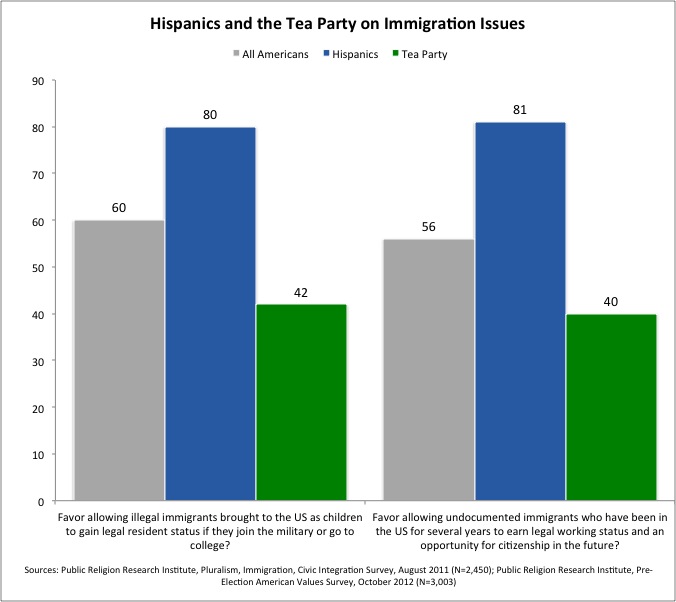The Tea Party just added itself to the ever-growing GOP-aligned groups interested in attracting more Hispanics as a way to enhance the party’s electoral prospects. In the wake of Obama’s strong performance among Hispanic voters in the 2012 election, the Tea Party Express, the largest Tea Party organization, has announced that it will start an outreach campaign to attract Hispanic voters.
The relationship between the Tea Party and Hispanic Americans has, in some ways, already begun. Several Hispanic Republicans, including Senators Marco Rubio (Florida) and Ted Cruz (Texas), and Representative Raul Labrador (Idaho), have been elected to Congress with strong Tea Party support. The ties do not stop there. More than one-quarter (26%) of Hispanic Americans report that the Tea Party shares their values, while 8-in-10 Americans who identify with the Tea Party have a favorable opinion of Hispanics.
However, despite these points of connection, Tea Party organizations seeking to build bridges with Hispanic Americans will face several obstacles. While 13% of non-Hispanic whites consider themselves to be members of the Tea Party movement, just 6% of Hispanics say the same. Moreover, as I demonstrated last week, the policy preferences of Hispanics and Republicans are often at odds. In the case of the Tea Party, some of these differences are exacerbated since members of the Tea Party tend to be more conservative than Republicans overall. The most glaring example is on the issue of immigration. While 80% of Hispanics support for a path to citizenship for children brought to the U.S. by their parents if they go to college or join the military—the basic tenets of the Dream Act—only 42% of the Tea Party agree.
Another possible roadblock is the division within the Tea Party to reach out to Spanish-speaking voters. Language remains an important and divisive cultural touchstone as Iowa Representative and Tea Party Caucus member Steve King told Fox News Latino in reaction to the House GOP Conference launch of a Spanish-language Twitter feed, “[t]here’s a conflicting message that comes out from the Republicans if we want to recognize the unifying power of English, and meanwhile, we send out communications in multiple languages.”. However, Marco Rubio has exhibited no such reluctance about embracing bilingual outreach, delivering the rebuttal to the President’s State of the Union speech in English and Spanish. The Tea Party has helped to elect articulate speakers with personal stories that might resonate with Hispanic voters, but the policy preferences and cultural differences loom large.





